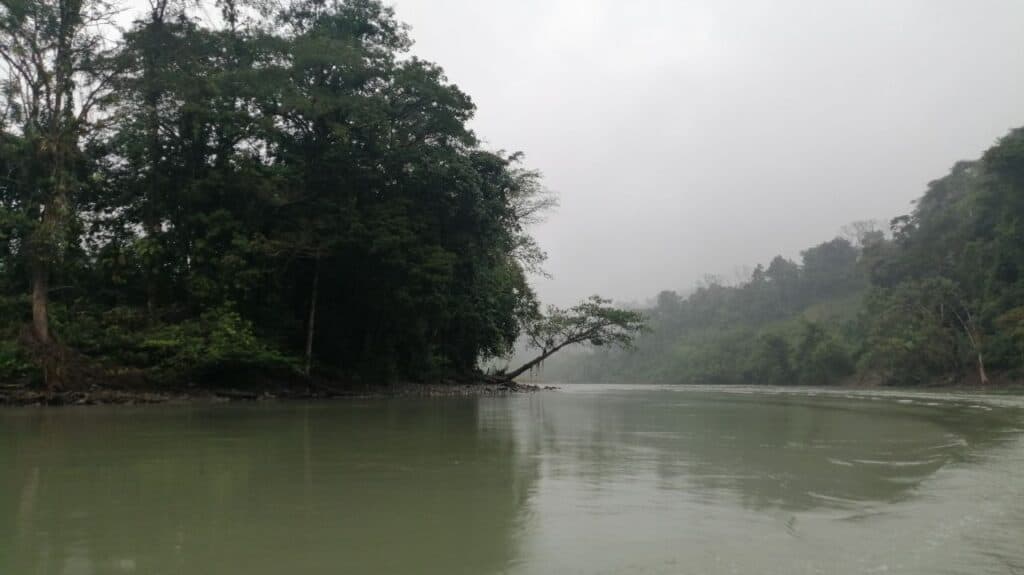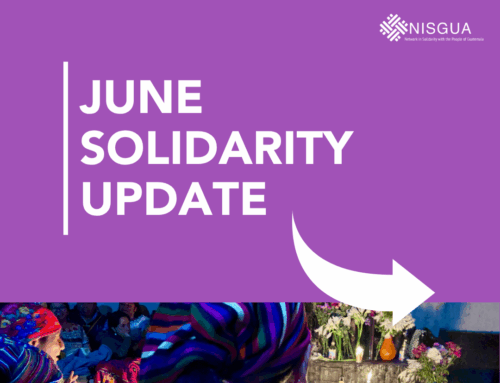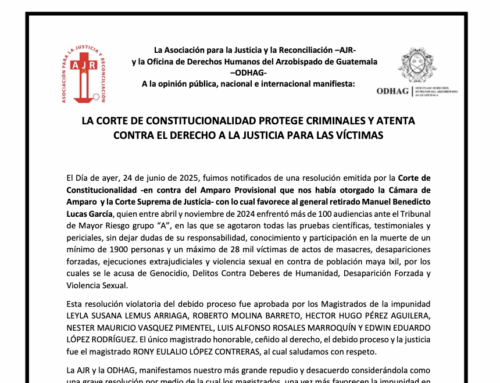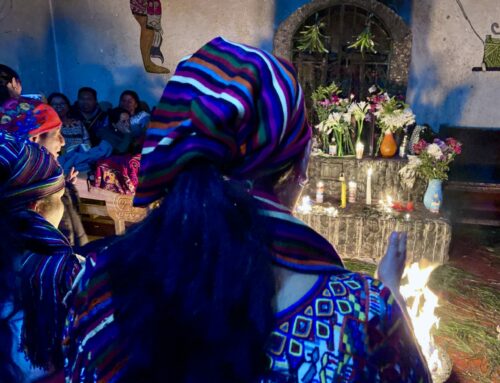March has been a month of transitions, from winter to spring, and in the processes of Mother Earth: it is the time to sow! Together, let us sow seeds of solidarity, resistance, and rebellion.
Ancestral wisdom teaches us that, in order to grow, seeds must take root in fertile soil. We invite you to strengthen your roots of struggle against systems of oppression by attending #WeavingKnowledges. Learn more about this collective space that allows us to reflect, question, and reconstruct ourselves politically together.
During planting, the air, insects, and birds carry seeds between territories. Similarly to migrants, these seeds face a series of natural and human or political obstacles that hinder their rooting. Read more in this update about the migratory measures in the United States that threaten the lives of people seeking to survive and flourish beyond borders.
As seeds grow, light and water are indispensable. The people of Guatemala currently face an environment hostile to growth: an adverse context of corruption and impunity. (You can read more below in our update about authoritarian regression in Guatemala.) But the people will not step down from the struggle for memory and justice – we see this clearly in the example of families of victims of the armed conflict, whose actions on the National Day for the Dignification of Victims of the Internal Armed Conflict we commemorate in these photographs.
At the end of this season, we plant not only for food but also to protect life in a world where the advancement of capitalism is destroying territories. Learn more about these struggles in the article “To fight for water is to fight for life.”
Thank you for starting this season with us. Please share this update with your network and tell us about your concerns about the struggle and resistance of the Peoples in Guatemala, the United States and the world.
Weaving knowledge
Over one hundred years ago a great leader said: ”Without revolutionary theory, there can be no revolutionary movement.” We wholeheartedly agree with this statement. We also add that without a strong analysis of the past and the present, we can’t chart a collective path to the future. We simply won’t understand where we’re going or why. For all these reasons, NISGUA is organizing “Tejiendo Saberes/Weaving Knowledges,” a political formation space to collectively strengthen our visions, dreams, analysis, and theories of struggle.
Each month (with a few exceptions) we gather virtually around a specific theme. In February we discussed “Militarism and Anti-Militarist Movements Between US/Guatemala.” In March the theme is “Criminalization of People and Organizations in Struggle.”
We invite you to join this space! Come with a drink, your favorite meal, your pet or your friend and comrade. There will be no liberation if our minds are imprisoned!
Email info@nisgua.org to register. We hope to see you!
Immigration policies in the U.S
Immigration policies in the U.S. are hard to keep track of. They’re intentionally confusing and hidden, and Biden’s administration confuses us further by publicizing his own as “humane.” Below, NISGUA summarizes some important policies to be aware of today, as the U.S. continues its endless, bipartisan policy of border imperialism.
- Title 42: This policy, instituted by Trump and kept by Biden, is set to expire in May 2023. Title 42 stipulates that people can be immediately deported from the U.S. back to Mexico upon entry, if they have traveled through a country with a risk of communicable disease. In practice, this allows immediate mass deportations because of the COVID-19 pandemic. As it approaches expiry, the U.S. government is concerned about a rise in immigration.
- Budget expansion: The Biden administration is proposing almost $25 billion for Immigration and Customs Enforcement (ICE) and Customs and Border Protection (CBP) in its FY2024 budget proposal, an increase of $800 million over the enacted 2023 budget. The proposal includes funding for an additional 350 Border Patrol Agents, $535 million for border security technologies, and more.
- Asylum Ban: Anticipating the immigration surge with the end of Title 42, Biden proposes a new asylum process, requiring asylum seekers to apply, and be denied, in each country on their way to the U.S. if they want to apply there. At that point, migrants must submit an initial application on a smart-phone app. The process risks stranding migrants in dangerous regions indefinitely as they wait on government bureaucracies. It also excludes anyone without smart-phones and wifi, and doesn’t account for the app crashing due to user overload, which has already happened, among other problems.
- Family detention: Anticipating the end of Title 42, the Biden administration is considering restarting the detention of migrant families who cross the border without documentation. If this policy is reimplemented, it means that families might be held indefinitely in detention centers until their court dates, rather than being released into the U.S. as they wait for court.
Authoritarian setback: Molina Theissen case and arrest of former human rights prosecutor Orlando López
International and national organizations warned about a new attempt by the Constitutional Court (CC) to maintain impunity for the crimes committed in the Molina Theissen Case. The CC’s decision orders that a new resolution be issued, which may favor house arrest for the former military officials, Francisco Luis Gordillo Martínez, Manuel Antonio Callejas y Callejas, Hugo Ramiro Zaldaña Rojas, and Manuel Benedicto Lucas García, who were sentenced for serious crimes against humanity committed against Marco Antonio and Emma Molina Theissen in 1981.
On March 16, Orlando López, former head of the Human Rights Prosecutor’s Office, was arrested at his home on alleged charges of abuse of authority for practicing as a lawyer during his tenure at the prosecutor’s office. NISGUA condemns the apprehension of Orlando López, which occurs within the framework of an alarming state policy of persecution, criminalization, and repression against judges, independent prosecutors, lawyers, organizations, and human rights defenders. Orlando López has played a key role in the investigation of serious human rights violations committed during the Internal Armed Conflict, including the Ixil Ríos Montt Genocide case and the CREOMPAZ case, among others. Various national human rights organizations have described this arrest as political revenge.
National Day of Dignification for the Victims of the Internal Armed Conflict
On February 25th, NISGUA was present at the commemorations held in Guatemala City and in Nebaj for the National Day of Dignification for the Victims of the Internal Armed Conflict (IAC). In this video, you can see several activities that were held to honor the memory of the lives taken by the Guatemalan state and military during the 36-year-long IAC.
Fighting for water is fighting for life
The ancestors of the Mayan people have always loved and respected the rivers and lakes, and this love and care has been transmitted over the years to the new generations that inhabit the Ixim Ulew territory. However, for decades, national and international private sectors have violated this sacred territory by installing hydroelectric plants in sacred rivers, hurting Mother Earth and the guardian communities of the territory. These communities, forgotten by the state, fight, resist and protect the water and the territory; their struggle is for life, for our lives; they are protecting life in a world where the advancement of capitalism is destroying the territories.
As NISGUA, on World Water Day, we honor the struggles of the communities of the Mayan people who defend water and resist extractivist processes in the country and celebrate the great victories they have had in their struggle which benefit us all. Since 2013, the Association of Communities for the Development, Defense of Land and Natural Resources (ACODET), has organized 37 communities around the Rio Negro in the north of the country to prevent the installation of the Xalalá Dam. The organization and resistance of the communities has been so strong that 10 years later, the communities are still organized and the dam has not been installed.
Meanwhile, for the last four years in Western Guatemala, an organization also made up of representatives of various communities, the Departmental Assembly of the People of Huehuetenango (ADH), has organized for “Municipal Water Protection Agreements”which are legal documents to protect water and the communities from the plundering they face. This powerful campaign is part of their strategy to make local authorities responsible for the care and protection of water.
FIGHTING FOR WATER IS FIGHTING FOR LIFE
The process of #resistancecontinues!







Leave A Comment